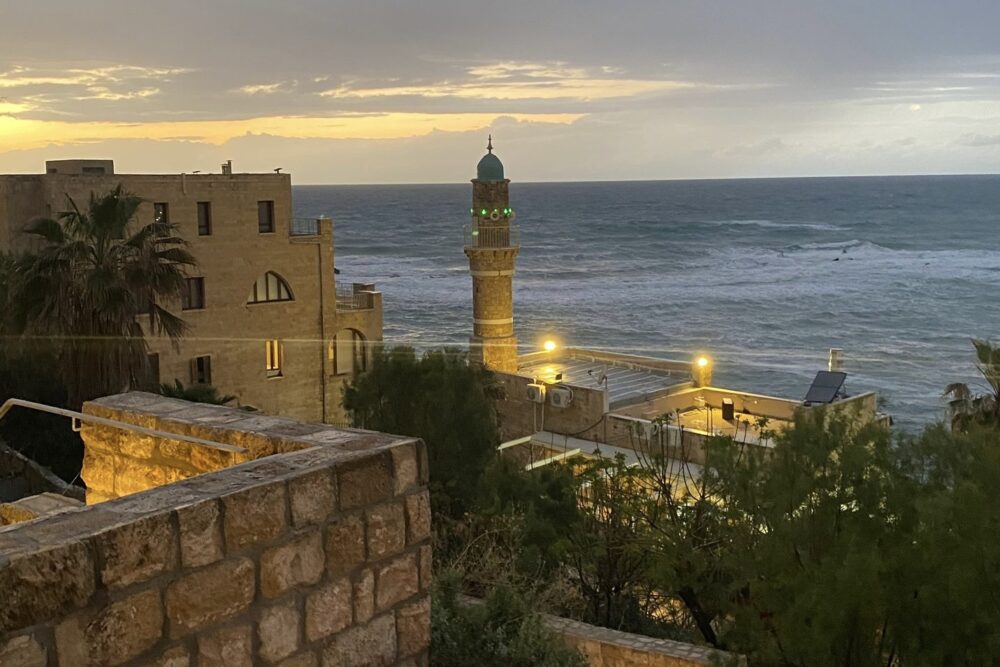
It was not yet 6 a.m. when we were roused from our beds by a hotel-wide security alarm at the Batsheva Hotel in the heart of Jerusalem. The announcement was in Hebrew, and none of us could understand it. Was it a fire? A bomb? Our WhatsApp group kept buzzing: “What on Earth was that?” we asked. Five minutes later, a text from our guide Eli Philip calmed everyone’s nerves. “It’s all good. False alarm,” he said. We shuffled back to bed, bleary-eyed, and slept for a few more hours before we began our last day in Israel.
We woke up (for real) to gloomy skies. At the breakfast table, Philip methodically distributed the stash of spices he had purchased in the Old City for those looking to bring home a souvenir. The smell of sumac filled the room. We had the morning to ourselves, so a few people went out to report or explore. Laura visited the Razzouk Tattoo Studio, the oldest tattoo shop in the world, and returned beautifully inked with a Picasso dove. Laura chose the image, a symbol of hope from Noah’s Ark, to remind herself of her hope for humanity and her belief in people, she said.
With that, we bid adieu to Jerusalem and boarded Lilian to head to Tel Aviv.
There, we made a quick pit stop to pick up Jack Saba, a team member of the Telos Group. We then met Robi Damelin, a remarkable woman who is the spokesperson for the Parents Circle – Families Forum (PCFF), a joint Israeli-Palestinian organization of more than 600 families, all of whom have lost a family member in the conflict.
Damelin joined PCFF after her son David was killed by a Palestinian sniper in 2002. She has since dedicated her life to the cause of reconciliation and nonviolence. Recalling the moment she received the news of her son’s death, Damelin told us, “all of my life I spoke about coexistence and tolerance. That must be ingrained in me because one of the first things I said was, ‘You may not kill anybody in the name of my child.’”
Damelin, who described herself as “rather rebellious,” mentioned the difficulties she faced growing up in South Africa. Ignoring apartheid laws, she dated an Indian man against her parents’ wishes. Her personal story was painful and moving, yet she filled the room with warmth. She carried herself gracefully and spoke with conviction.
After our meeting with Damelin, we met Dahlia Scheindlin, one of the local experts who helped us in shaping our reporting topics. With a master’s degree in theological studies from Harvard Divinity School and a PhD in political science from the University of Tel Aviv, Scheindlin is a public opinion expert for political and social campaigns in Israel. Scheindlin answered our many questions regarding the conflict and touched on reporting techniques that could help us with our journalism moving forward. She addressed questions that had come up for us in our reporting. Sarah asked about claims she had heard from Christian clergy and advocates that Americans were involved in many of the attacks against Christian holy sites in Jerusalem. Scheindlin wasn’t aware of that trend, but noted that Americans tend to play an outsize role in Israeli politics – on all sides – because they tend to be financially better-off, and in many cases moved to Israel for ideological reasons, from more politically active backgrounds.
Back on Lilian on our way to Jaffa, Saba, who is Christian, shared his incredible love story with a Muslim girl. Early in their relationship, they faced backlash from both families and community members.
We were at the edge of our seats waiting to hear how the story ended, when our attention was redirected to the sun setting over the Mediterranean and the echoing call for the evening prayer from a seaside mosque in Jaffa. After acknowledging the moment, we turned back to Saba, who finished his story. With a lot of perseverance, secret dating and determination, he told us, the couple stood their ground until their families came around and accepted their decision to get married. Today, they live in Tel Aviv with their daughter.
“These relationships, although rare, can be found here,” Saba said.
During Saba’s story, Laura was nearly jumping out of her seat. She had been interviewing people from interfaith relationships all week, and this was just the kind of story she was looking for. Stay tuned to read her piece in the coming weeks.
We then headed to our final dinner in Israel at a Jaffa restaurant called Par Derriere. As we settled in our seats, it dawned on us that this was the last time we were all going to eat together at the table in the Middle East.
Goldman shared the founding story of our class, Covering Religion. After a trip to Israel with his family in the early 2000s, a representative of the Scripps Howard Foundation asked what he would do with his class if he had money, he recalled. “ I would love to take my students to Israel too,” he responded. That is how we came to be at the table with him, more than 20 years later.
Although experienced in traveling with students, Goldman acknowledged that this trip had been particularly challenging. He highlighted tough conversations between him and Khalil that shed light on the complexity of the conflict and how there was a lot he needed to reflect on personally. Khalil and Goldman toasted to each other, acknowledging that the difficult conversations had brought them closer. We took turns sharing lessons we learned during the trip and questions that still lingered.
We began this trip as strangers. After sharing 10 days together, we returned to New York City as friends with whom we shared a deep connection and experience with. In the weeks since the trip, we’ve remained a tight-knit group, digesting what we saw and the news that comes out of Israel/Palestine.
